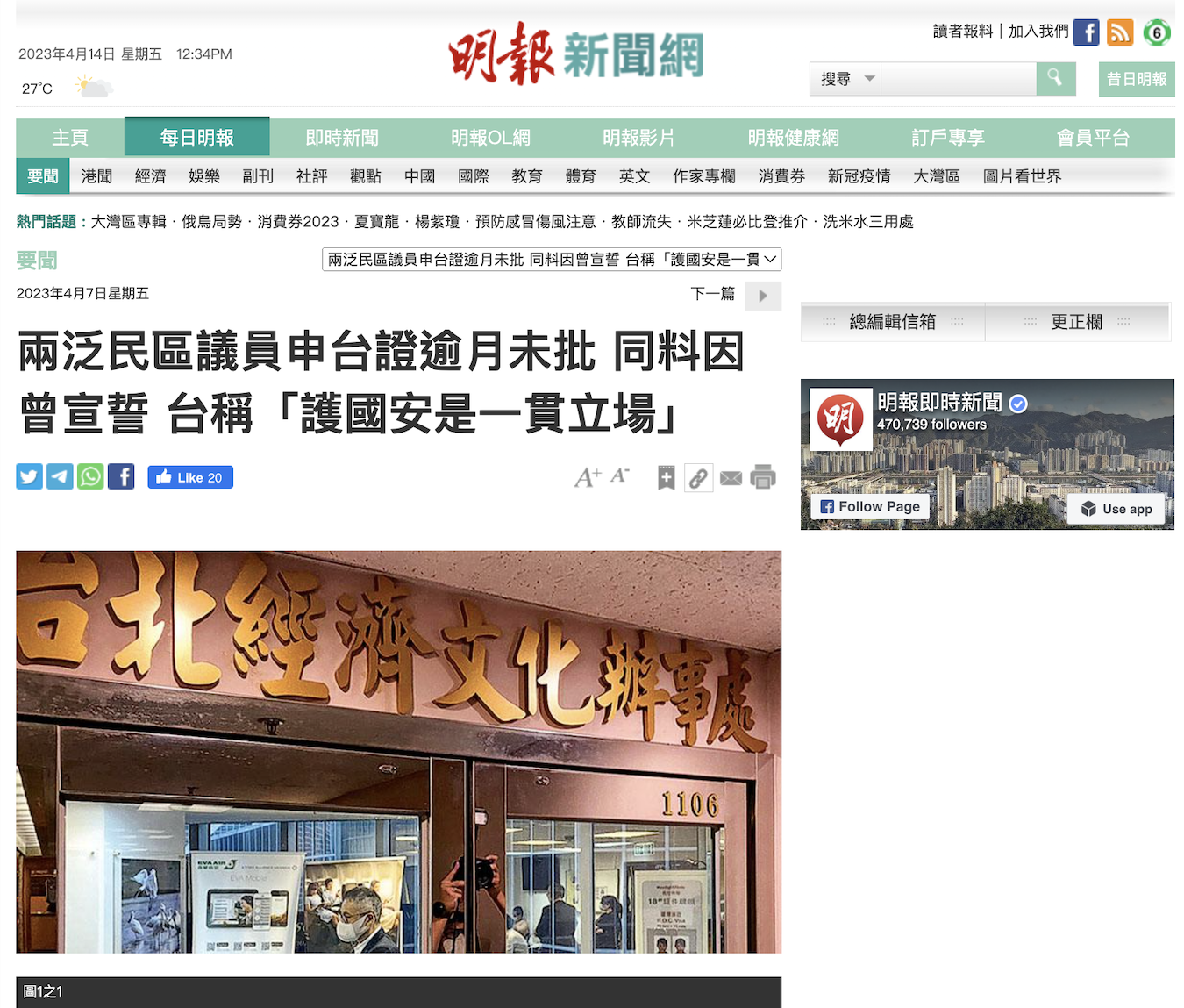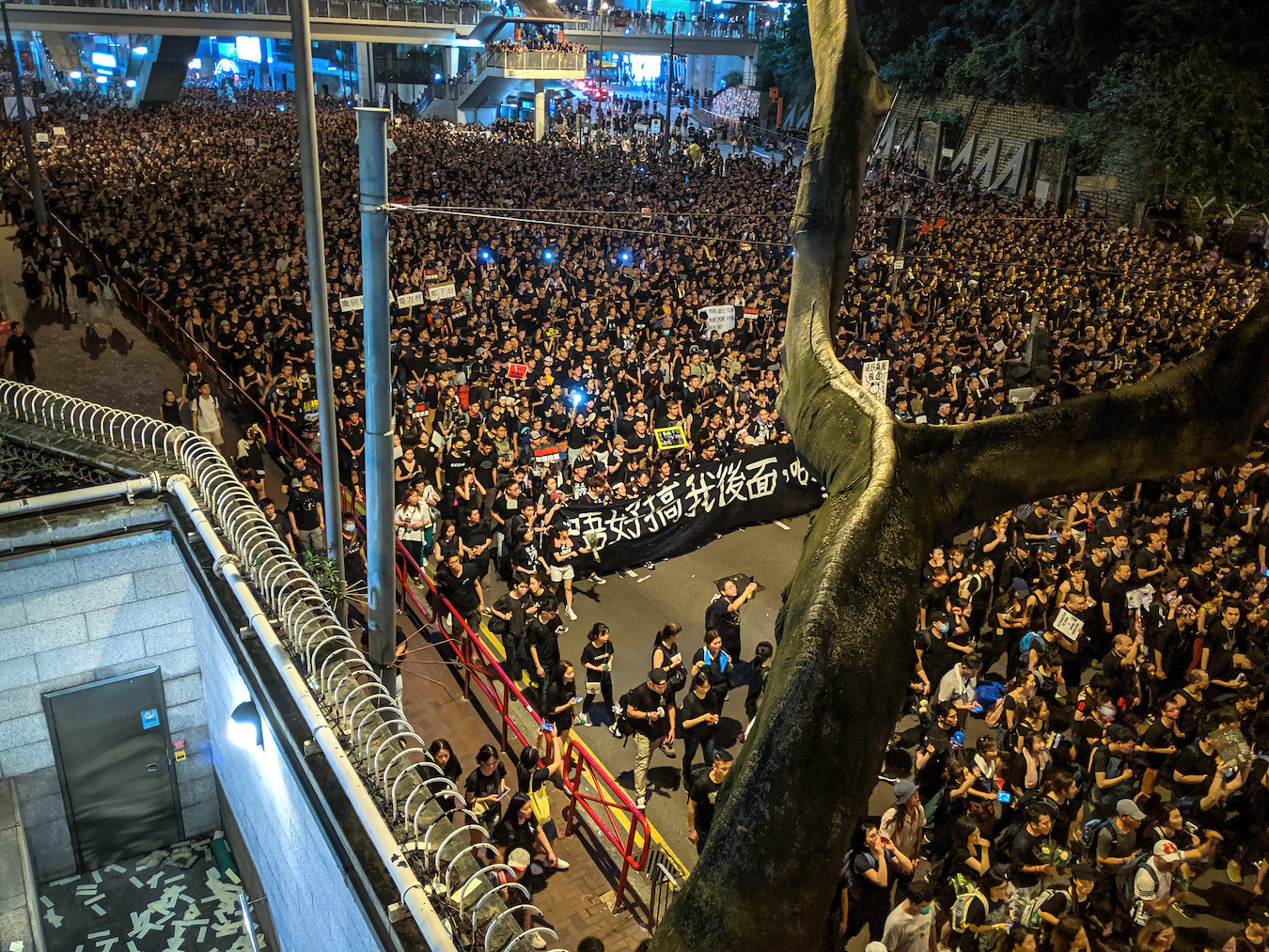by Brian Hioe
語言:
English
Photo Credit: Studio Incendo/Flickr/CC BY 2.0
A REPORT BY Hong Kong’s Ming Pao last week stated that at least two current pro-democracy Hong Kong district councilors and several former Hong Kong district councilors have not heard any answer from the Taiwanese government when applying for visas to visit Taiwan, or had their applications rejected. This occurred despite that these district councilors were not intending to flee to Taiwan for asylum, were only hoping to travel with friends and family to Taiwan to vacation, see friends, and sightseeing, and some had successfully entered Taiwan as recently as 2021.
One of the district councilors interviewed for the article, who went by a pseudonym, stated that he was asked to fill out another application requiring more documentation after completing an online application, and then after some delay, requested to submit more documentation physically at Taiwan’s office in Hong Kong. But by then it was already too late for him to travel to Taiwan because the holidays were over. Another district councilor was denied a visa on the basis of his occupation. It appears to be a recurring pattern for Hong Kong politicians to be required to complete an online application after the initial application, to be asked to submit additional information about their itinerary, or to be asked to visit Taiwan’s representative office in Hong Kong but still hear nothing about their application or have their application denied, raising questions about whether there are political considerations involved and why they are made to jump through hoops for unsuccessful visa applications.
 The article in question
The article in question
The report stated that the current Hong Kong district councilors suspected that the rejection was because they had sworn loyalty oaths to Beijing in order to take office, even if they were pro-democracy politicians. That being said, there have been cases in which pro-democracy district councilors that had resigned rather than taken a loyalty oath to China also had their visas denied.
What seems to frustrate some of these pro-democracy politicians is the apparent arbitrariness of the vetting process for Hong Kong politicians hoping to travel to Taiwan, in that different applicants were subject to different processes. Likewise, according to the Hong Kong district councilors interviewed in the article, they were aware of other cases of Hong Kong district councilors successfully entering Taiwan even if they themselves were blocked.
Tik Chi-yuen, the only remaining non-Beijing Legislative Council member–even if Tik has more recently signed onto a statement praising Xi Jinping–stated to the Ming Pao that he and members of his centrist Third Side Party, which positions itself between the pro-Beijing and pan-Democratic camp, were successful in traveling to Taiwan as recently as last year to observe nine-in-one elections. At the time, they were not asked to submit their itinerary. For its part, when asked to comment by the newspaper, Taiwan’s Mainland Affairs Council claimed that political considerations now are very different than three years ago, hence the new measures.
The apparent denial of visas to Taiwan for pro-democracy district councilors may reflect the hardening line toward Hongkongers in Taiwan. Namely, Taiwanese appear to increasingly view Hong Kong as part of China, and Hongkongers as indistinguishable from Chinese.
The increasing suspicion of Hongkongers may be most visible in the delay of a planned residency plan for Hongkongers in May 2022 after criticisms from DPP legislator Lin Ching-yi, who suggested that the residency plan could allow for Chinese spies to mix in with Hongkongers. Lin was criticized then by members of Taiwanese civil society supportive of Hongkongers for not being aware that Taiwan already had means by which Hongkongers could secure permanent residency in Taiwan.
 Photo credit: Studio Incendo/Flickr/CC BY 2.0
Photo credit: Studio Incendo/Flickr/CC BY 2.0
The Tsai administration, in particular, has been criticized for making Hong Kong into a significant campaign issue before the 2020 presidential elections, leveraging on public outrage after the 2019 protests that broke out in Hong Kong, yet not doing enough to help Hongkongers. In the lead-up to the election, the Tsai administration promised to assist Hongkongers. But an office opened up by the Tsai administration to help Hongkongers has been accused of doing little, including not granting visas to high school-age Hong Kong activists that were later arrested, and instead mostly redirecting Hongkongers to regular channels to enter Taiwan such as study, investment, or entrepreneurship. The Taiwanese government has also been criticized for strange perceptions of links to the Chinese state, such as not granting Cathay Pacific airline workers visas, seeing as Cathay Pacific’s investors include state-run Air China.
Indeed, the Taiwanese government has a poor record when it comes to asylum seekers, as was perhaps most visible in 2019 when two Chinese dissidents seeking asylum were stranded in Taoyuan International Airport for over 100 days because the Taiwanese government initially refused to let them in. Apart from that the government may have been hoping that they would simply go back to China, even if that meant they would be arrested, part of the issue seemed to be bureaucratic confusion about what to do with them. Even in a time of increased backlash from Taiwanese against Hongkongers, this probably also plays a factor as to why Hong Kong politicians with demonstrable pro-democracy records were denied visas.

